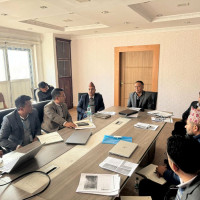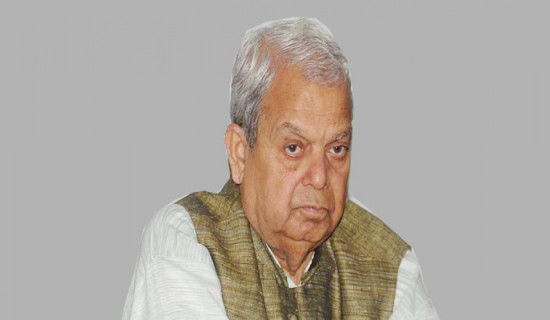- Wednesday, 7 January 2026
DDC: A Dairy Dealer Or Developer?
My baby grandson once asked me, “Grandpa, where does milk come from? Does a machine eat grass to give milk?” He is a city-born child who knows that DDC sells milk but has no idea where it comes from. Poor baby had no idea that DDC (Dairy Development Corporation) is a state-owned enterprise with its first market venture in Kathmandu. The first DDC depot is still operational in Lainchaur. Sixty years ago, as a student from Terai, I remember the depot having left me with an unusual experience. My friend and I noticed a customer buying something called cheese there. We had never seen or tasted it before, so we bought 100 grammes out of curiosity. We split it, both wishing for a larger piece. Upon first bites, we looked at each for reaction. Our taste buds found the bite disgusting because it had a peculiar smell. After the third bite, my friend’s nose twisted rather than say, “Oh, awful indeed!” and he threw it in the trash. I did the same. However, the milk was tongue-licking. It took us years to develop a taste for cheese.
Unlike my grandson, I grew up in Terai, where I saw landlords raising cattle herds beside forest pastures. The cattle chewed on fodder and herbs, producing organic milk with thick cream layers every morning. Sweet makers bought the milk in bulk and used it to make curd, rich-flavoured ghee, and various sweets with a natural taste and freshness. The cattle sheds were cleaned daily, and their urine and dung left an organic smell.
On my first visit to the Lainchaur depot, I imagined that DDC had undertaken a huge task of raising pasture-fed cattle. This sparked my curiosity about its farms, pasturelands, and milk processing machinery. However, as a student preparing for university exams, I could spare no time. Only years later, I learned that DDC virtually had no cattle farms or pasturelands. Instead, individual farmers sold milk to DDC through cooperatives. DDC collected, preserved, pasteurised, and processed the milk into various products like yoghurt, butter, cheese, and paneer. By all means, DDC relied on individual farmers, without whom its milk plant would be useless. Nevertheless, it continues to undertake this colossal task today.
The discussion here focuses on DDC and its objectives. Its primary objective was to promote the white revolution, a movement to increase milk production, in an agricultural nation like ours. As such, it has the social responsibility of promoting health and nutrition by marketing homogenised and nutritious products. Farmers and their cattle make it a first priority. Therefore, it is their guardian and mentor and ensures economic well-being and health, which also covers educating their children. In this way, it is farmers’ debt of gratitude and caretaker. Initially, Denmark and Switzerland were its donors and advisors to run it as a non-profit organisation through milk cooperatives.
As a city dweller, I rely on DDC for its products. However, I notice changes in the operations now that affect its quality and reputation. Its idea of being with the farmers through cooperatives sounds healthy, but recent reports indicate that DDC has strayed from its steps. Allegations go to some executive members of these cooperatives who are now focused more on personal gains than the farmers. This abuse is now a concern for the DDC to move along the correct trend.
I met Dr. Dhan Prasad Neupane, a retired high-profile technician at the DDC Basantpur depot, by chance. As we talked, he expressed deep concerns about cattle health and financial corruption within the cooperatives. He also raised issues about the Murra breed of buffaloes, a recent gift from the Prime Minister of India. His chief concern was their feed. He pointed out that DDC lacks specialised feed for the Murra breed, and the only Hetauda industry lacks the machinery and capacity for sufficient generalised feed production.
However, he mentioned that private industries also face similar challenges. They, too, have flooded the market with synthetic or chemical feed products. While they use wheat chaff or straw in their production, they fail to yield milk with rich cream. Dr. Neupane also mentioned another negative impact: the overuse of such chemicals has led to lumpy skin disease in cattle.
This shift has affected dairy consumers, as many have now become non-vegans. Ironically, the national D.D. Board continues to advertise 'drink nutritious and hygienic milk' on Radio Nepal every morning, despite failing to ensure hormone-free ingredients. This has created a dual risk for the consumption of milk and milk products. Furthermore, there is a complete lack of pastureland and its research. Dr. Neupane sadly adds that 'DDC has transformed into a hub for political employment.’
DDC, no milk trader
DDC's middle 'D' implies development. Currently, its primary focus is on procurement, processing, and distribution. Cooperatives, once integral to supporting farmers, cattle health, and fodder, seem to have deviated from their original role. A significant concern is there: DDC fails to pay farmers their dues running in billions. It means DDC fails along with the farmers but performs administrative and technical aspects, such as infrastructure, staff, machinery, and packaging, as if these were its primary objectives. Although the cow holds the status of a national emblem under the constitution, specific measures to improve cattle breeds and health are conspicuously absent. Another disappointment lies in the operational milk powder factories. Biratnagar has one under government management, but it falls short in terms of quality. Chitwan is home to three private factories, all grappling with operational challenges. These indicate either substandard milk quality or the use of second-hand machinery.
Challenges and responsibilities
Presently, scores of private dairy companies are working in the free market economy. DDC believes that it has a two-thirds share. A critical debate can arise here: what role should it play? Some believe that its role should be like what Nepal Rastra Bank does in controlling the money market and addressing its issues and challenges. The Dairy Development Board (DDC) could serve a similar role in milk market regulation, ensuring quality and optimum fair pricing for farmers, cattle herds, and consumers. This leads to a simple question: given that DDC fails to pay overdue bills, do consumers ever purchase its products on credit? Another contradiction is there: it declares milk holidays and also battles with supply shortages. Moreover, until recently, it imported milk from the neighbouring Terai region in Bihar. An air of rumour occasionally harasses the farmers — DDC is planning its handover to a foreign company!
Then I go back to the old days. DDC could consider running pilot cattle farms for high-breed calves and cattle to generate thousands of jobs. These farms could also be based on green grass, hay, and ensilage, all organic. There are potential pasture zones in the nation, e.g., Khaptad and the foothills of Chure. As per the breaking news report about its scope of export to Malaysia, it could equally sell organic products, like butterfat and ghee, similar to what Indian dairy companies are exporting.
(Baral is a retired lecturer of English)







-square-thumb.jpg)








